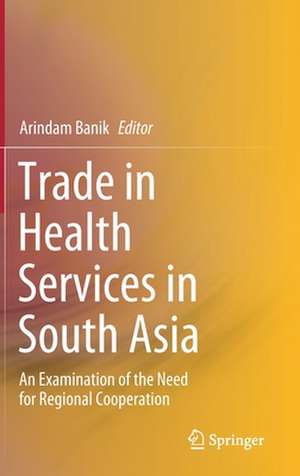Trade in Health Services in South Asia: An Examination of the Need for Regional Cooperation
Editat de Arindam Baniken Limba Engleză Hardback – 13 feb 2020
| Toate formatele și edițiile | Preț | Express |
|---|---|---|
| Paperback (1) | 932.64 lei 6-8 săpt. | |
| Springer Nature Singapore – 13 feb 2021 | 932.64 lei 6-8 săpt. | |
| Hardback (1) | 944.06 lei 6-8 săpt. | |
| Springer Nature Singapore – 13 feb 2020 | 944.06 lei 6-8 săpt. |
Preț: 944.06 lei
Preț vechi: 1151.28 lei
-18% Nou
Puncte Express: 1416
Preț estimativ în valută:
180.64€ • 189.11$ • 149.47£
180.64€ • 189.11$ • 149.47£
Carte tipărită la comandă
Livrare economică 05-19 aprilie
Preluare comenzi: 021 569.72.76
Specificații
ISBN-13: 9789811521904
ISBN-10: 9811521905
Ilustrații: XX, 139 p.
Dimensiuni: 155 x 235 mm
Greutate: 0.4 kg
Ediția:1st ed. 2020
Editura: Springer Nature Singapore
Colecția Springer
Locul publicării:Singapore, Singapore
ISBN-10: 9811521905
Ilustrații: XX, 139 p.
Dimensiuni: 155 x 235 mm
Greutate: 0.4 kg
Ediția:1st ed. 2020
Editura: Springer Nature Singapore
Colecția Springer
Locul publicării:Singapore, Singapore
Cuprins
Chapter I. Introduction.- Chapter II. Demystifying Catastrophic Expenses in Indian Health Care Sector.- Chapter III. Health Sector in Bangladesh: Overview .- Chapter IV. Health Sector scenarios in Sri Lanka: Policy designing and implications.- Chapter V. Health Sectors scenarios in Pakistan: Policy Priorities and Challenges ahead.- Chapter VI. Health Services in Nepal.- Chapter VII. India: Emerging as major destination of quality Health Care.- Chapter VIII. Summary and Conclusions.
Notă biografică
Dr. Arindam Banik is currently Director of the International Management Institute (IMI), Kolkata, India deputed from International Management Institute, New Delhi. He is Distinguished Professor International Management Institute, New Delhi. He obtained his PhD from Delhi School of Economics in 1994, and went on to pursue his postdoctoral research at Manchester Business School and the Department of Economics, University of Cambridge (1994-95). He also taught at the Department of Economics, University of West Indies, Cave Hill Campus, Barbados (2000-2005). Professor Banik is a recipient of numerous awards, including the prestigious SANEI Research Award (by the World Bank and Global Development Network), and the University of the West Indies Campus Research Award for two consecutive years (2002 and 2003). He has worked as a consultant for various government and multilateral agencies including the World Bank, FICCI-New Delhi, International Development Research Centre (IDRC), ACC Mumbai, UNIDO, ILO, Indo-Canadian Cooperation Unit, GTZ and Government of India (Ministry of Rural Development) , Caribbean Development Bank, and Government of Barbados. He has published more than 100 papers on international economics, macroeconomics, corporate governance and economic development. He has authored several books, including "Towards A Common Future: Understanding Growth, Sustainability in the Asia-Pacific Region" published by Palgrave-Macmillan, London, and articles for various magazines and newspapers. He is the editor of the respected management journal Global Business Review.
Textul de pe ultima copertă
This book observes that an in-depth study exclusively focusing on health service trade not only strengthens the overall services trade capacity of the South Asian region, but also promotes global as well as regional trade. There is a dearth of analytical research on estimating barriers to trade in health services, particularly in the context of South Asia, and as such, this book assesses the potential benefits and economic costs of barriers to trade in health services in select South Asian economies. It also analyzes the impact of liberalization and regulatory reforms on economic welfare. It broadly addresses issues relating to trade in health services, the GATS (General Agreement on Trade in Services), such as: Why are the current levels of trade in health services low? How will the GATS legally affect a country’s health policy? What effect might liberalization have on national health systems? And what are the likely benefits of greater trade in health services? It also provides specific answers to the following questions: Does the substantial role of the government in health – as health service provider, financial supporter, regulator and promoter – have implications for the treatment of the sector under the GATS? What is the impact of liberalization of international trade in health services on the quality and availability of health services in developing SAARC countries? Given the importance of consumption abroad for trade in health services, and the gradual opening of health markets through Modes 1 and 3 (cross-border supply and commercial presence), how can problems associated with trade in these Modes be prevented? And are these problems sufficiently addressed by GATS disciplines? Answers to these questions will be of great use to researchers, policy makers as well as practitioners and NGOs of South Asia.
Caracteristici
Addresses an important issue related to health services in South Asian countries, specifically Nepal, Bangladesh, India, Pakistan, Sri Lanka Assesses the challenges and opportunities presented by the liberalization of trade for the provision of health services Suggests options for national policymakers in Nepal, Bangladesh, India, Pakistan and Sri Lanka relation to health services
